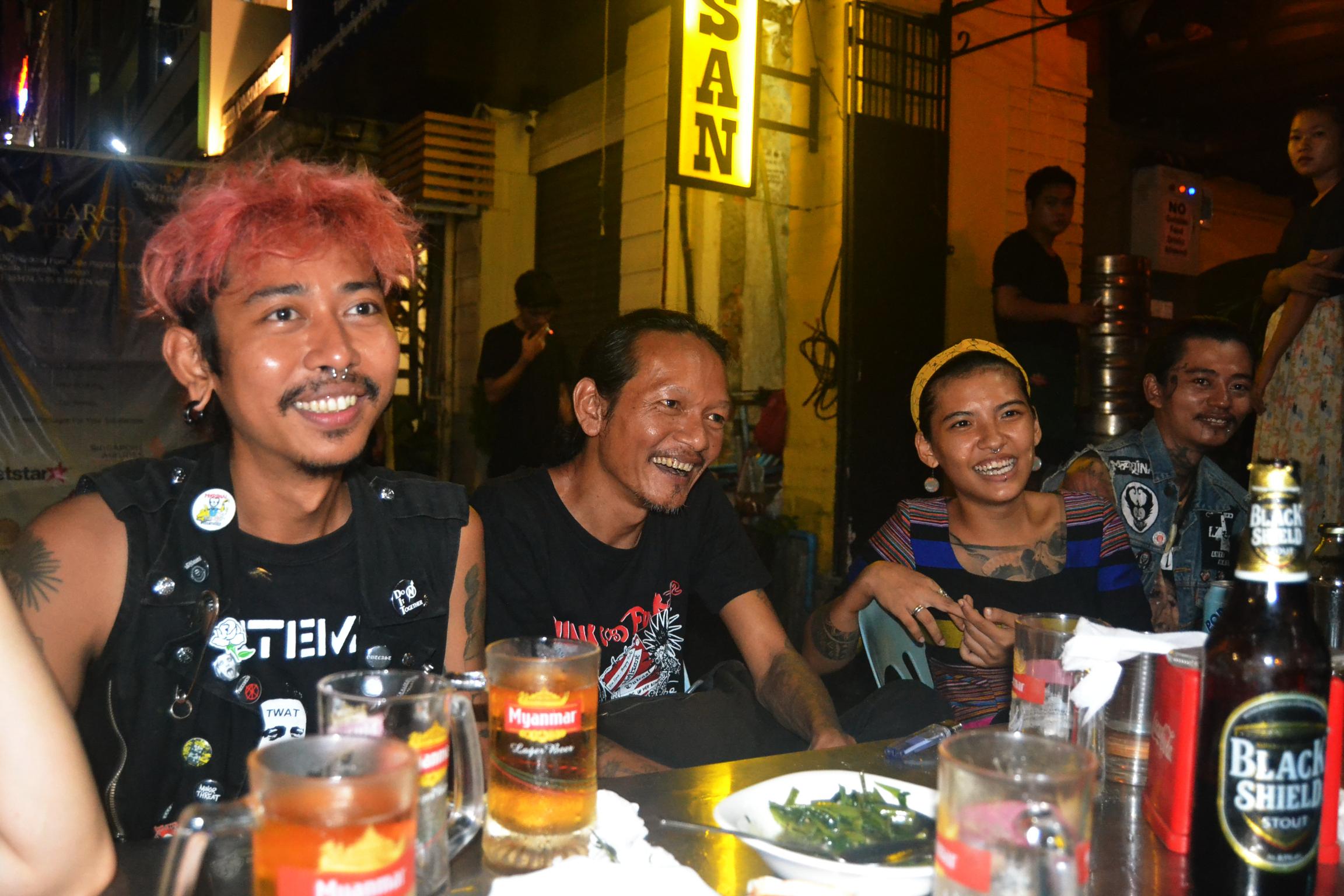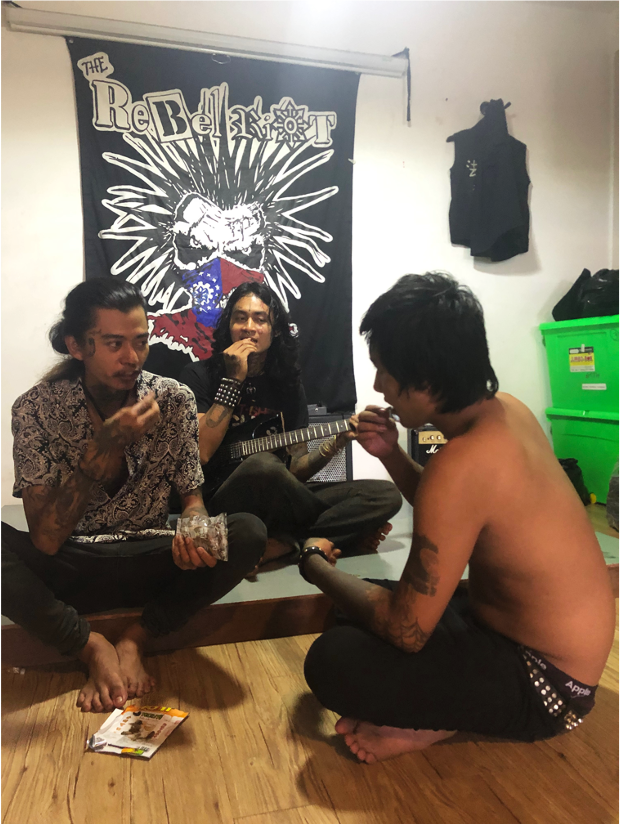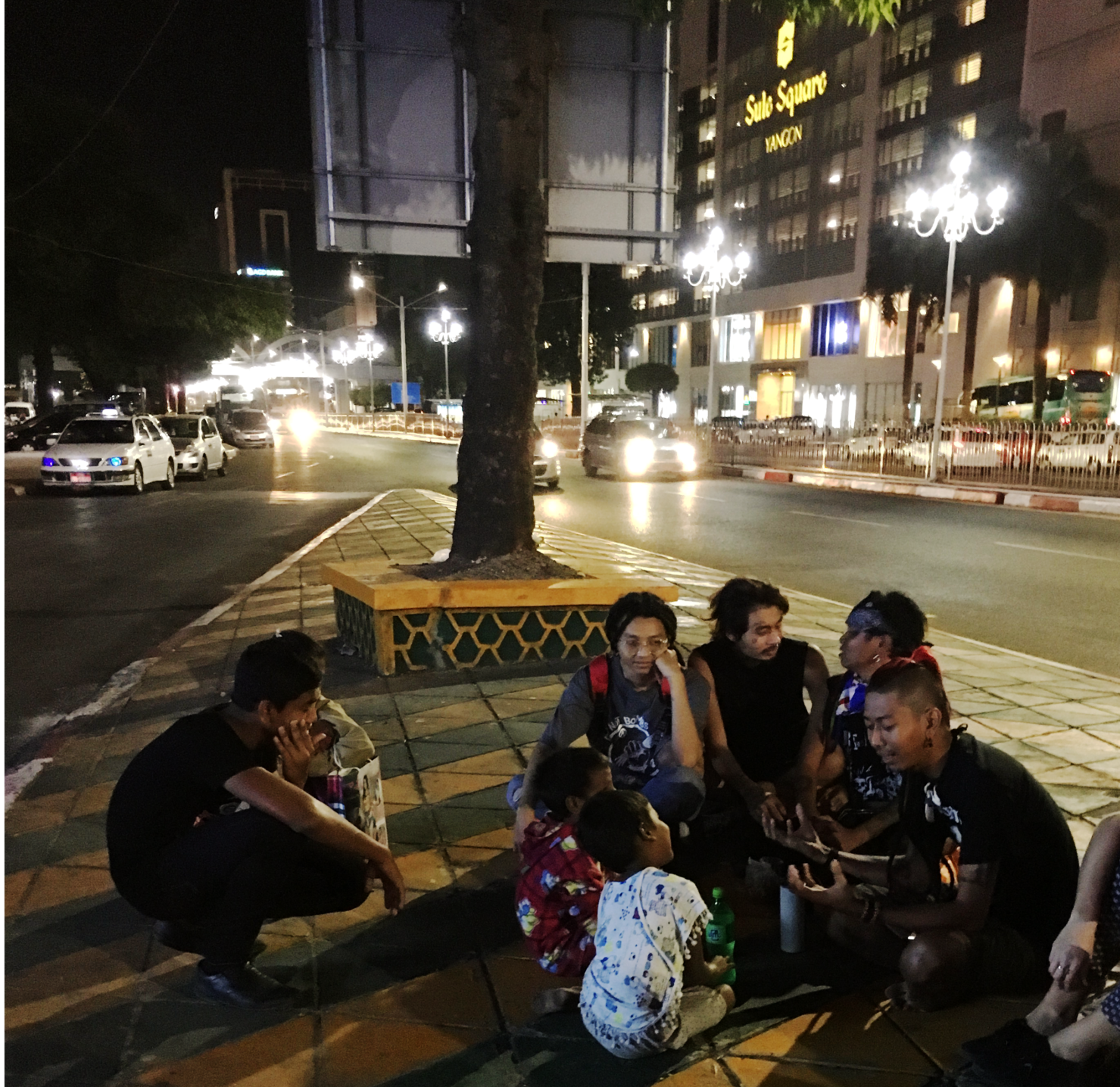Carolin Hirsch
Becoming Rebel Punk
(Per)forming (as) a cultural minority

At the „Minorities in Myanmar“ conference, held at the Lindenmuseum in Stuttgart, Germany last October, Carolin Hirsch talked about the Rebel Punk lifestyle and how the members of Yangon’s Rebel Community form a cultural minority through performing their ‘Punk’. This blog post complements her talk, offering us insights into the worlds of one of Yangon’s punk community.
The ‘Rebel Community’ is a group of people who follow a certain Punk lifestyle, meaning a conglomerate of self-defined ethical guidelines and visible characteristics. This community is best known for the band Rebel Riot and the Yangon chapter of the ‘Food Not Bombs’-organization. Although some of the 25 Rebel Community members are widely known also for their political stance through their social media engagement, little is known about the individuals themselves, their biographies, and their ideas behind the usage of the term Rebel.
In my research, I consider the Rebel Punk lifestyle an activist lifestyle, and a coping strategy to overcome traumatizing experiences while growing up in marginalized circumstances. In this blog post, I will show how I relate people’s experience of poverty as well as their rejection of religion to (per)forming (as) a cultural minority. To exemplify these links, I will introduce one of my interlocutors, a twenty-something Punk who shared his life story with me but prefers to stay anonymous.
Becoming Punk
„The worst thing is when people get discriminated for their background. [..] My home sent me 30.000 MMK per month. When I registered for the tuition, I had to pay 20.000 MMK. And the rest for general expenses at school. So, I didn‘t have any money for myself. Sometimes, I used the money for myself and then I didn‘t have enough money to pay for my exam fees. That’s when the teachers blamed me in front of the whole class, […]. They treated me like I‘m the worst person in the whole school. Once I won a prize, but the teacher refused to give it to me. […] That’s why I became rebellious, I think. If I didn’t have any problems like that in my life, if my parents sent enough money for school and I didn‘t have to live in monasteries, then I think none of these will have happened.“[1]
Originally coming from the countryside, my interlocutors’ family had sent him to attend high school in Yangon for Grade 9 and 10. The prize he is referring to, was a prize he got for never missing a day at school. „At the monastery, the monks beat the kids, right? So when the teachers beat me at school, it felt just like an itch to me“, he explained. Through going to school, he was able to escape the monastery, where he had to do hard physical work and got beaten up for making mistakes. He was choosing the violence at school over the violence at the monastery, since „the head monk was beating harder than the teachers“.
In search of other ways to escape the monastery, he had also started to spend time on the streets, where he eventually met the Punks. That’s when he got several facial piercings and customized the shirt he had to wear as part of his school uniform, through cutting off the sleeves and sewing patches of Punk bands on it, among them Rebel Riot.
The treatment by teachers and the monks had made him feel like being not normal and an outcast. Through changing his looks, he opted to embrace this role and thus reclaimed the feeling of empowerment and autonomy over his body. Additionally, his new Punk friends offered him shelter. He started to sleep on the street with them or stayed at the Punk community house. Becoming friends with the Punks and becoming a Punk himself gave him the affection that he wasn’t getting from the people who were meant to take care of him away from his natal family. He found an alternative family in the Punk community that offered him approval and emphasized with his struggles, something the other community members were able to relate to.

Bonding among outcasts
„I wasn‘t normal. I was an outcast. In order to build a connection with others through that feeling, you can‘t be a normal person. I grew up with problems, […]. But my feelings are more rebellious. I think people with the same feeling become a group. And I found other people who had the same feeling as me. And we are close until now.“
The experiences that come together in Rebel Community and over which the members bond are experiences of domination in institutions that bear family resemblances. My interlocutor’s experience of living in the monastery was, as is the case for many others, caused by his family’s poor background. Since they were not able to afford his upbringing at home, he had already been sent to live in monasteries when he was attending Grade 2. Resulting from his time in monasteries and his experiences with monks, he started to develop strong negative feelings towards the ways Buddhism was practised in these contexts. He took this criticism further, by rejecting how Buddhism as a religion is practiced in Myanmar more generally. My interlocutor is not the only one within his community who holds this attitude. Strikingly, although most of the Rebel Community are male Bamar Buddhists according to their ID cards, only four of them self-identify as Buddhists.[2] The other members state to have no religion or being atheists.
What I described here through the biography of my interlocutor are examples of a power imbalances between a dominant and a subordinate group. The dominant groups in the biographies of the Punks consist of parents, teachers and monks. The subordinate groups, who the Punks used to belong to, are children, students, novices. Sometimes, people experience subordination through intersectional roles – like being a child and a student or a novice at the same time. In the general societal context of Myanmar, there is a hierarchy in these relations that cannot be overcome. This is especially true for precisely the groups mentioned – monks, parents and teachers, who traditionally enjoy a great deal of respect and authority in Myanmar’s Buddhist society. In these contexts, the subordinates cannot give a slap for a slap, in the actual and figurative sense, to their dominant counterparts. They are in a state of powerlessness and exposition. Becoming „rebellious“ and going after that feeling of being an outcast, instead of trying to fit in and please the superior other, constituted a way of gaining back a feeling of power and autonomy. For my interlocutor, as for the others, these experiences of inequality and oppression raised „rebellious feelings“ inside of them that found expression through becoming a Punk in appearance and performing the role that they felt was attributed to them: Bad persons.
Since there is no direct translation of the word Punk into Burmese they are referred to as lan tha yae (street ghosts). Someone called lan tha yae is generally considered to be a criminal, jobless, an alcoholic, a drug user as well as someone who is rude and violent, and looks ‘different’ because of their tattoos, piercings, and outfits that do not match standard fashion. The Punks meet the cliché at least to some extent and make use of it to embody their feelings of being made outcasts. This conscious self-identification as an outcast is part of basically every life story shared with me by the Punks. When I was asking what unites them, the answer I got was that they „are all outcasts, rejects of society“.
Having a rebellious mind and escaping oppression through becoming lan tha yae-lookalike Punks made them become tha pone – rebel. Rebels are usually defined as people who challenge a dominant counterpart. However, within the Rebel Community, the term is defined as someone who stands up against an oppressive power and changes her/himself first before they try to change others.

Becoming Rebel
„What is the rebel? There are two kinds of rebel for me. The first is the rebel militaries that are fighting against the government with guns. The second kind of rebel for me is a new human being. We are living in our society, in old structures, old ideas and an old system – it’s an old society. We want to break all the old things. We want to create a new lifestyle and a new human being – because we want to change. What is an old human being? For me, an old human being is like a zombie. Not all humans of course, but a lot of. They are greedy and selfish. They forgot about love, kindness and compassion. So, a rebel is a reborn new human being with love, kindness and compassion. With being rebels we want to make a rebellion against this old structure. […] Our definition of a rebel is no violence, just showing our love before we die. So, this is what we believe a rebel is“ (Kyaw Thu Win, 09.05.2018).
In this quote, my interlocutor Kyaw Thu Win is, in the first place, making a distinction between two kinds of rebels – violent and non-violent ones. Being a non-violent rebel is a part of the Rebel Community-identity. The second distinction he makes is one between rebels as new human beings in contrast to old human beings. In this interpretation of his social reality, the majority of people constitutes the old society, whereas he belongs to the minority of new human beings, working towards non-violent social change.
Although he makes a generalization with the notion of an ‘old society’, that does not correspond to the realities of Myanmar’s religiously, ethnically and socially diverse population, I read this notion as a reference to the general established societal expectation within the Bamar Buddhist majority, that are dominating the activist’s everyday lives and life worlds. In this quote, and on many other occasions where we talked about Punk and their social reality, the Punks were exhibiting a great extent of Othering to explain themselves to me: It’s us – the Punks – and them – the society.
Through becoming a Punk and joining the Rebel Community my informants were forming a cultural minority and performing Rebel Punk as an expression of their minority status. Becoming a Punk was and still is a way for them to cope with the hardships they experienced in their childhood, teenage years and early adulthood. Moreover, Rebel Community itself can be understood as an activist project, where marginalized young adults come together and bond over shared experiences and build a family resemblance group. However, through starting from helping each other in the first place, they build up an infrastructure of broader activist projects within which they address people they can identify with, usually through poverty-related circumstances. Through a range of activist projects, the Punks approach people who face similar hardships like they have and try to provide physical and emotional support on the grassroots level, especially to children living in marginalized conditions. In this way, Rebel Community extends support beyond the group of Punks that form their immediate social peer group.
Carolin Hirsch is enrolled as a PhD candidate in Social and Political Anthropology at the University of Konstanz in Germany. She carried out long-term ethnographic fieldwork in urban Yangon in Myanmar, focusing on a group of Punk activists who are centred around the Burmese Punk band Rebel Riot.
[1] This interview series was conducted in April 2019 over the course of three days, in which my informant shared his life story with me in Burmese language. A local friend of Rebel Community was helping us out as a real time translator. All quotes in this article stem from this interview series, which afterwards got transcribed and translated by my research assistant Hnin Ei Hlaing, herself a member of Rebel Community. She also provided the translation and definition of the Burmese terminology that will follow later on in this article. The quote of Kyaw Thu Win at the end of this article stems from an interview we had in May 2018 in English language.
[2] In March 2020 Hnin Ei Hlaing made a demography of Rebel Community in which she asked the members, amongst other things, what ethnicity and religion they are assigned to in their ID cards and how they identify themselves in contrast to this offical document.
